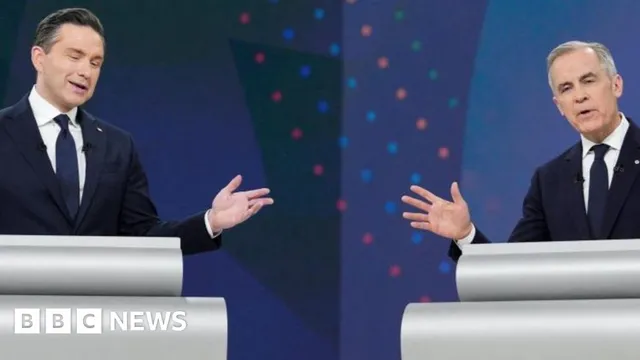
Canada's party leaders clash in final debate ahead of election
2025-04-18 01:51- The second and final debate of Canada's four major party leaders took place on April 18, 2025.
- Major issues discussed included the trade war with the U.S., affordability, crime, and environmental policies.
- The debate’s outcome is crucial as Canadians prepare to vote in the snap election on April 28, 2025.
Express your sentiment!
Insights
The leaders of Canada's four major federal parties faced off in their second and final debate on April 18, 2025, as they prepared for the country's snap election scheduled for April 28. The debate encompassed several pressing issues, including the ongoing trade war with the United States, housing affordability, crime, and environmental concerns. Conservative leader Pierre Poilievre, New Democratic Party leader Jagmeet Singh, and Bloc Québécois leader Yves-François Blanchet all targeted Liberal leader Mark Carney's association with former Prime Minister Justin Trudeau, questioning whether Carney could provide a new direction for Canada amidst the challenges facing the nation. Significantly, the leaders were pressed on their strategies for addressing the tariffs imposed by U.S. President Donald Trump, particularly the 25% tariffs on Canadian goods. The participants acknowledged the complexities of negotiating with the Trump administration while attempting to minimize the impact on Canadian citizens. The Liberal position focused on shifting towards targeted tariffs that would aim to inflict damage on the U.S. economy while safeguarding Canadian interests. As the debate progressed, Singh highlighted the struggles faced by everyday Canadians, tying his policy proposals to personal stories of hardship related to healthcare and rising living costs. Each candidate made an effort to connect with voters, despite the competitive nature of the debate, which was characterized by a mix of direct confrontations and some mollifying tones, a departure from certain aggressive past political encounters in both Canada and the U.S. The debate was not just an opportunity to critique each other's policies but also a platform to outline visions for the future as voters prepare to head to the polls. With the backdrop of pressing national issues like climate change, gun violence, and healthcare reform, the candidates appeared acutely aware that they were vying for the electorate's confidence at a critical juncture. The contributions from Singh, Poilievre, and Blanchet suggested a shift in the political landscape, aiming to challenge the traditional power balance held by the Liberal government. The conversations around Trump’s tariffs, in particular, underscored the looming economic uncertainties that could impact voters' decisions in the forthcoming election, potentially reshaping the political map of Canada as polls indicate waning support for the center-leaning Liberal Party.
Contexts
The importance of the leaders’ debate in the context of the 2025 Canada federal election cannot be overstated. As Canadians prepare to head to the polls, the leaders’ debate serves as a crucial platform for political discourse, showcasing the candidates' policies, ideologies, and their capability to lead. In a democracy, informed voting is essential, and the debates provide voters with valuable insights into the parties’ positions on key issues that affect Canadians' daily lives. It allows the electorate to assess not only the politicians' plans, but also their ability to communicate effectively, handle pressure, and engage with complex questions, which are vital skills for any leader. Furthermore, the leaders’ debate plays a pivotal role in shaping public perception and influencing undecided voters. With the proliferation of social media and instantaneous access to information, the debates have become focal points for both supporters and critics alike. The way candidates articulate their views can sway opinions, change the direction of campaigns, and alter the dynamics of the race. Historical data indicates that performance during debates can result in significant shifts in polling numbers, making it an essential moment in the election cycle. Moreover, the 2025 election comes at a time when Canada is facing a multitude of pressing challenges, including economic recovery post-pandemic, climate change, healthcare reform, and social equity issues. The leaders’ debate presents an opportunity for the participants to address these topics head-on, allowing them to differentiate their platforms and respond to pressing concerns that voters prioritize. Voters are looking for authenticity, empathy, and actionable solutions; thus, how well leaders articulate their vision can impact their credibility greatly. In summary, the leaders’ debate for the 2025 Canada federal election is not merely a ceremonial aspect of the electoral process but a critical component that can influence voter behavior and the subsequent political landscape. It serves as a vital forum for scrutiny and dialogue, reinforcing democratic engagement and accountability. With insightful exchanges, voters can make informed decisions that reflect their values and priorities, ultimately shaping the direction in which Canada will move forward.